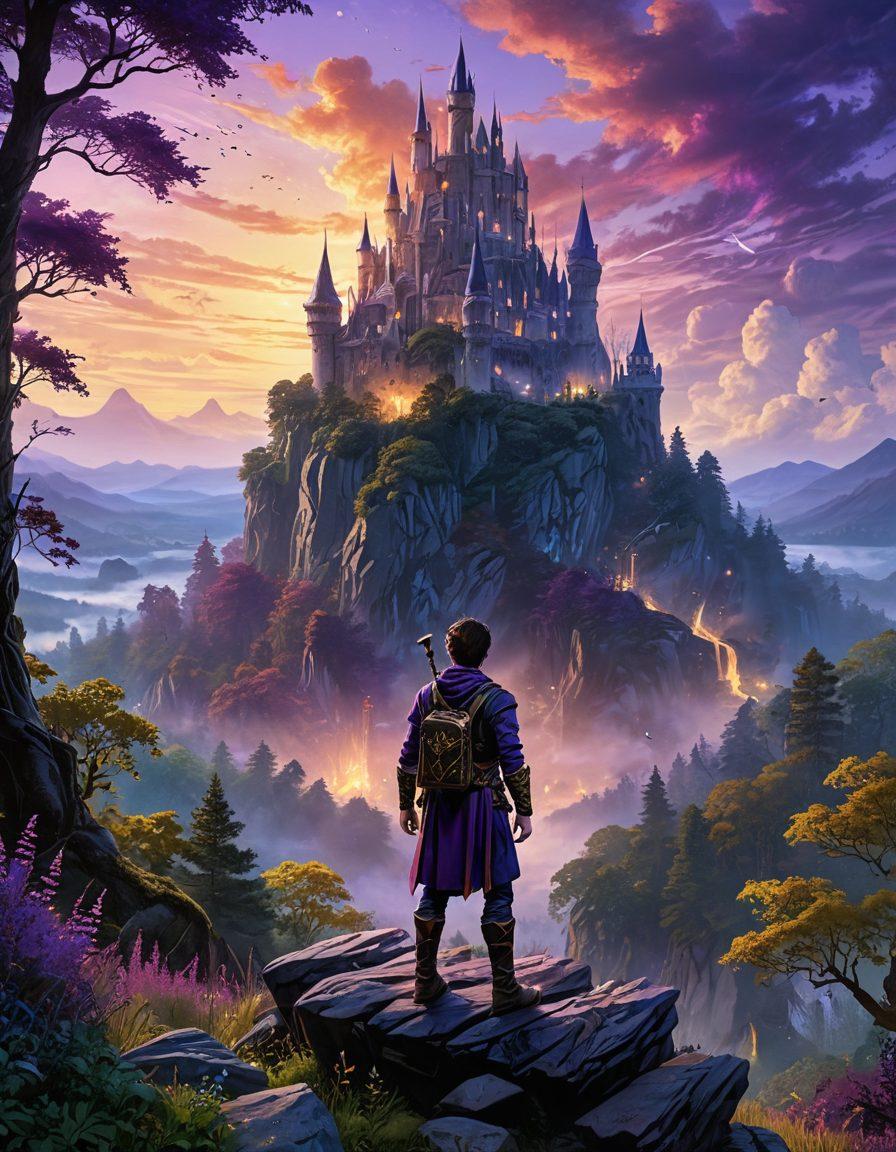Unveiling the Art of Fantasy Writing: Insights and Techniques from Steven Erikson
In the world of fantasy fiction, few names resonate like that of Steven Erikson. An author known for his monumental series, 'Malazan Book of the Fallen,' Erikson takes readers on an expansive journey filled with complex characters, intricate plots, and epic themes that challenge our perceptions of storytelling. Whether you're an aspiring writer or a devoted fan of the fantasy genre, mastering the craft of fantasy writing requires insights from the very best. As Erikson shows us, the beauty of fantasy lies not just in its ability to create worlds, but in its capacity to delve deep into the human experience. How can Erikson's techniques enhance your own writing? Let’s explore the key elements that define his approach to fantasy writing and storytelling.
At the heart of Erikson’s fantasy novels lies exceptional character development. He populates his narratives with a diverse cast, each character rich with their own backstory and motivation. It's a reminder that well-developed characters can breathe life into any story structure. Consider this: Have you ever read a book and felt genuinely connected to its characters? Erikson crafts his characters with such depth that their triumphs and failures echo within us, prompting meaningful reflections on our own lives. When embarking on your own story creation, take the time to develop your characters fully. Create intricate backstories, diverse personalities, and imperfect traits—this is where relatability comes into play, making your readers truly engage with the narrative.
Plot development in Erikson’s work is no less impressive. His narratives often weave together multiple storylines, with arcs that intersect in unexpected and riveting ways. This complexity invites readers to think critically, inviting a sense of intrigue as they immerse themselves in a world where every choice has consequences. Do you ever wonder how you can keep your readers guessing? One technique inspired by Erikson is to plan your narrative structure with twists that build momentum. Balance your arcs—allow subplots to inform and enrich the central narrative, creating an intricate tapestry of storylines that captivate from beginning to end. This technique not only enhances reader engagement but also fuels the thematic exploration of your work, leaving your audience craving more.
Another essential aspect of mastering the craft is thematic exploration. Erikson’s fantasy fiction often addresses profound issues—war, mortality, and the struggle for identity. By embedding these themes into the fabric of the narrative, he prompts readers to engage in literary discussions long after the last page is turned. To emulate this in your own writing, think about the underlying messages you want to convey. What themes resonate deeply with you? As readers dive into your story, they are not just seeking escapism; they are hungry for reflections on their reality. This connection fosters loyalty and intrigue, making your work a topic of conversation in literature blogs and book recommendations alike.
Finally, it’s crucial to employ effective narrative techniques that elevate your writing style. Erikson utilizes vivid imagery and rich, poetic language, underscoring the importance of imaginative writing. According to the author, “Storytelling is not just about conveying ideas but about weaving a narrative that feels alive.” This quote encapsulates the essence of creative storytelling that delves into every nuance of the human condition. As you refine your own writing techniques, remember to play with language—experiment with dialogue, internal monologues, and descriptive passages that create an immersive experience. By tapping into this imaginative approach, your fantasy writing can flourish, resonating powerfully with readers and establishing your unique voice within the rich landscape of fantasy literature.
Exploring Epic Narratives: How Erikson Transforms Storytelling in Fantasy Novels
In the vast sea of fantasy novels, few authors make waves quite like Steven Erikson. His work has become synonymous with epic narratives and complex world-building that challenge the norms of traditional storytelling. If you’ve ever found yourself lost in multi-layered plots, laden with intricate character arcs and thematic elements, you have likely encountered Erikson's unique approach to fantasy writing. But what precisely sets his storytelling apart in the realm of fantasy fiction? Let’s dive into how Erikson transforms narrative techniques and reader engagement in his works, crafting tales that resonate long after the last page is turned.
Erikson’s journey into the world of epic storytelling began with a vision—a dream to create a literary universe dripping with mythology and rich with character development. His flagship series, *Malazan Book of the Fallen,* carries readers through a landscape teeming with gods, mythical creatures, and philosophical undertones. With this ambitious undertaking, Erikson doesn’t just tell a story; he composes a symphony of narrative tension and thematic exploration. This kind of fantasy writing often invites the reader into a dialogue, prompting questions like, ‘What are the moral implications of power?’ or ‘How does destiny shape our character?’
One of the key writing techniques Erikson employs is his masterful story structure. His narratives often intertwine multiple subplots and character arcs, each adding depth and breadth to the overarching tale. This multi-threaded storytelling might feel daunting, but it ultimately results in a richer, more immersive reading experience. Erikson’s approach serves as a great example for fiction authors eager to hone their narrative analysis skills. Consider this: How can layering various perspectives evoke stronger emotional responses in readers? Erikson’s work illuminates how interconnected stories can reflect the chaos and complexity of life itself.
Erikson isn’t just a storyteller; he’s a conjurer of vivid imagery and poignant themes. When reading his novels, you might find yourself pondering deep philosophical questions amidst the action-packed scenes. This thematic exploration allows readers to engage with the text on a more significant level. For those participating in writing workshops or literary discussions, Erikson's work offers a treasure trove of insights into character motivations and plot development. How do Erikson’s characters respond to life's challenges? It’s this realism blended with the fantastical that keeps readers glued to every page.
As you embark on your own journey through fantasy writing, take a page from Erikson's book—pun intended. Embrace the idea of expansive world-building, take risks with your story structure, and don’t shy away from diving into the deep end of character development. Book reviews and recommendations often herald Erikson as a beacon for aspiring authors. Consider how his techniques can inform your own narrative style, and remember: creative storytelling isn’t just about what you write; it’s about how you make your readers feel. Let the legacy of Steven Erikson guide your imaginative writing adventures.
Unlocking Character Depth: Insights into Erikson's Approach to Character Development and Plot Structure
When we think about the *fantasy genre*, our minds often drift toward tall tales of dragons, epic battles, and hero's quests. Yet, at the heart of every engaging fantasy novel lies something deeper: character depth. This is where *Steven Erikson* shines as a master of *fantasy writing*. His works are not just tales spun from an imaginative mind; they resonate with readers on a profound level due to the complex, well-crafted characters that populate his narratives. Have you ever put down a book, captivated by a character's journey? If so, you know just how vital character development is to the reader's experience.
Drawing from *Erikson's* techniques, character development begins with understanding that every character should serve a purpose in the *story creation*. Erikson infuses his characters with flaws, dreams, and intricacies that mirror real life. This method invites readers to invest emotionally, creating a bond that transcends the page. Think about your favorite characters. What turns them from flat figures into relatable, nearly breathing entities? Perhaps it's their struggles, their growth, or the way they navigate their worlds with both triumph and failure. This level of depth is what *Erikson* excels in and highlights in his epic sagas, such as the *Malazan Book of the Fallen* series.
Erikson's approach to *plot development* is equally crucial. He often intertwines multiple narratives, effectively using *narrative techniques* that keep readers on their toes. This weaving of stories encourages a *thematic exploration* that enriches the overall narrative. Imagine being on a roller coaster with twists and turns; that’s how Erikson crafts his stories. This technique not only captivates but also challenges the reader to piece together the larger puzzle. How do you balance your story structure to maintain reader engagement? What if you took a page from Erikson’s playbook and experimented with shifting points of view or parallel timelines?
In the realm of *literary exploration*, *Erikson* invites aspiring *fiction authors* to dive deeper into character backstories and plot arcs. Not every character needs to be the hero; sometimes the villain carries the most profound narratives. Providing varied perspectives can also illuminate hidden layers in your story, making it richer and more immersive. As you flesh out your characters, ask yourself: what are their motivations? How do their desires shape the plot? The answers may propel your narrative into unexpected territory, much like *Erikson's* unconventional storytelling.
Lastly, as you embark on your *fantasy writing* journey, take a moment to allow yourself space to experiment. Join *writing workshops*, engage in *literary discussions*, and don’t shy away from polishing your craft through *book reviews and recommendations*. By engaging with the *literature blog* universe, you’ll not only refine your skills but also learn to appreciate the *genre analysis* that great authors like *Steven Erikson* have laid down. Whether you’re penning a short story or an entire epic, remember: it's the characters that will resonate long after the last page is turned. What kind of legacy do you want your characters to leave behind?


